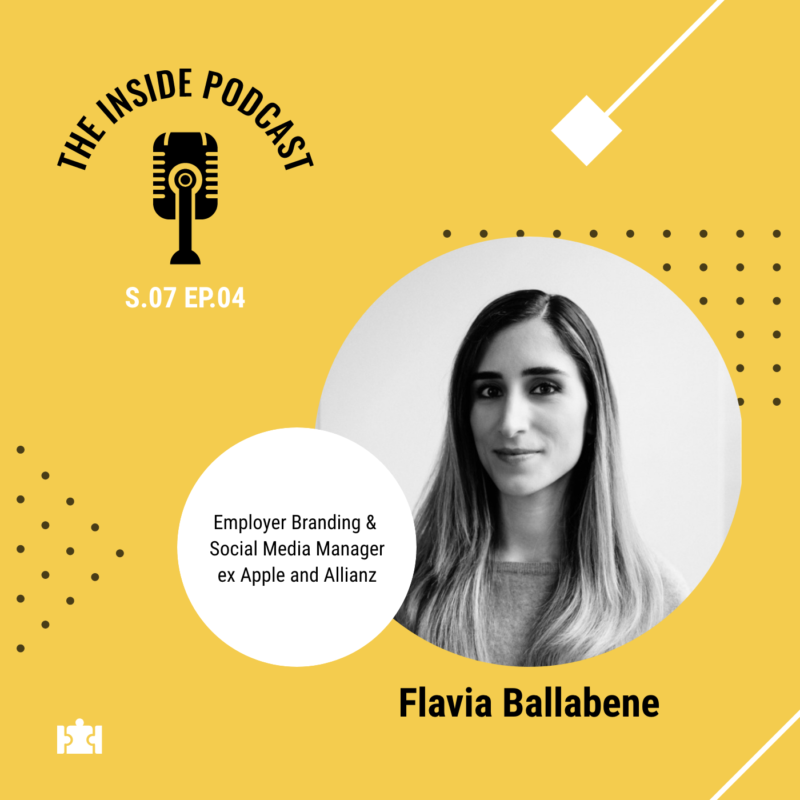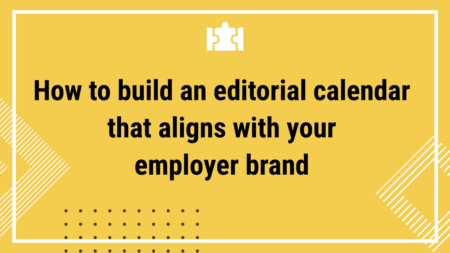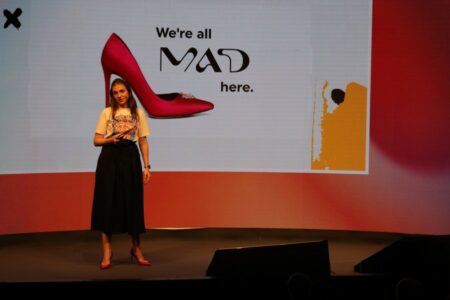Hi, my name is Georgiana. I am the CEO and founder of Beaglecat, and soon you will be listening to Employer Branding: The Inside Podcast. In this podcast, I regularly talk to employer branding managers and acquisition managers, and human resources managers in tech companies in Germany, Romania, and the US. For more content on employer branding-related themes, go to employerbranding.tech or beaglecat.com. Stay tuned!
Overview
Episode 4 of #Employer Branding: The Inside Podcast is #LiveNow!
This time around, we spoke with Flavia Ballabene, Global Employer Branding & Social Media at Allianz, about the importance of having a #strategy in mind when building your #employerbrand. Also, we talked about creating a strong cultural foundation, creating & keeping a sense of #connection, adding social media marketing into the mix, and a lot more.
What you’ll learn by listening
- Strategies worth having in mind when building your employer brand
- Tips for building a foundation for employer branding efforts to pay off
- How employer branding helps companies deal with the hybrid work model
- Insights on keeping a sense of connection at the workplace
- Integrating social media marketing into the employer brand
- Employer branding predictions for 2023
About Allianz Group
The Allianz Group is one of the world’s leading insurers and asset managers with more than 100 million private and corporate customers in more than 70 countries. We are proud to be the Worldwide Insurance Partner of the Olympic & Paralympic Movements from 2021 until 2028 and to be recognized as one of the industry leaders in the Dow Jones Sustainability Index.
Caring for our employees, their ambitions, dreams and challenges is what makes us a unique employer. Together we can build an environment where everyone feels empowered and has the confidence to explore, to grow and to shape a better future for our customers and the world around us. Join us and together, let’s care for tomorrow.
Podcast link – Enjoy listening on Spotify!
Podcast transcription – Employer Branding T.I.P S07Ep.04
Georgiana:
Hello, everyone! Another episode of Employer Branding: The Inside Podcast. And as you all know, this season is focused on Germany. And although my guest today is not located in Germany currently, she has worked for a very German company. Allianz is the name of the company. And my guest’s name is Flavia Ballabene. I hope I pronounced your name correctly. Flavia, thank you so much for accepting to talk to me today. Welcome! And please just take a few seconds to introduce yourself.
Flavia Ballabene:
Of course, my pleasure. So, as you listen to me speak, you might feel an Italian accent in my voice. That’s because I hail from Rome, Italy, where I spent my early years. So again, I’m from a homeland rich culture and tradition. So then as I embark my professional journey, started holding sales. There was my first role and from there and move on to paid advertising, the world of digital marketing and exploring new ways to reach customers. And then as my experience grew, I went into international marketing.
I took this role as an international marketing manager. And it allowed me to work with a diverse range of end to end marketing projects, online and offline. But it wasn’t until I joined Apple, that I truly found my niche. It was there that I discovered my passion for employer branding, which I kept working, then Ronstadt. And then, as you say, technology as an employer branding and social media manager. During these years also I lived in four different countries. So you say correctly, so apart from Italy, I lived in Spain, London, in UK, Munich in Germany, and now I’m based in Los Angeles. Looking back on my journey, my path has been a winding one, full of twists and turns. But if we didn’t have it in any other way, I’ve got the valuable experience that today is fundamental for my work in employer branding.
Georgiana:
Super. Well, I’m looking forward to you sharing some of that experience with us today. And without going into company specifics, meaning company names, let’s say, are there projects you are very, very proud of in your professional past, either at Apple or at Allianz? Projects that you feel have brought having reached your expertise as an employer branding manager, or a project in which you feel you’ve contributed a lot.
Flavia Ballabene:
Yeah, it’s hard to say because managing several projects, EVP campaigns, onboarding, career website, you name it. But one of the projects I always mention was a campaign that I’m most proud of is our recruiting marketing one across the media, for roles that were covering the 80% of the revenue generation of the company. So as you may imagine, there was a lot of pressure from the business from a time perspective and return on investment one. We started this a double day campaigns by running several internal interviews with internal talent, talent acquisition team across EMEA, we did a lot of external research to understand the talent pool at a conversation with the business leaders to make sure that we had enough data, insights and valuable inputs to understand our talent segments, pain points.
And considering that we were operating across EMEA even roll the roll was same. The talent personas across the countries were completely different. So it added a layer of complexity, I would say. We then translated these data into creative briefs and targeted settings to make sure that the campaigns were resonating as is as with the target audience; and was actually shown to the right talents as well. And so to keep it short and sweet at the end, the campaign generated qualified candidates rate improvement by 29%, without decrease of time to fill and also in the cost per hire. So with a pretty chaotic one, a lot of pressure, we didn’t have so much time to do that. But at the end was really rewarding. And in terms of results was great, because we understood, we supported the business in the right way.
Georgiana:
And now as you look back to this project, or maybe two other projects as well, are there any particular approaches or strategies that you feel could be beneficial to some of our listeners?
Flavia Ballabene:
I would say, in general, for employer branding, so it’s not just some better off campaigns. I think the important thing, first of all, when jumping in our new project is to understand our company, culture values, our talent, segments, completion, pain points, because it’s when we understand who we are, and the context in which we operate, no matter the project we are doing is that then when we are able to do implementation and activities that makes sense.
So as I say, the research is fundamental. And the reason why I say that is because many times we tend to rush into the implementation phase, and it’s pretty understandable because many times employer branding is a one man show role. After you have a solid strategy that can be the EVP or social media strategy as well, then you have a strong foundation for your employer branding efforts. And then we tend implementation, then you can be at an online, really strong online presence and social media presence, your website, job boards, review sites. But first of all, you need to make sure that your strategy is strong enough.
Georgiana:
Which is something that I could also not stress enough because most of the people we work with, most of our clients, want to rush directly into business usually. And indeed, it’s important to know who you’re preparing the campaign for, because that can make it or break it in the end.
Flavia Ballabene:
Exactly, because then also the values, the key message, they must resonate within the organization and also externally but to do that, you need to do a little bit of research to really understand the context.
Georgiana:
Flavia, there’s one topic that’s been bothering me since the pandemic and since most companies that we work with that I know here in Germany and in Romania have adopted the hybrid work structure. I’m wondering, how is Employer Branding, helping these companies and people working remotely? How does remote work happen when we talk about companies as big as Apple for example, or Allianz?
Flavia Ballabene:
We learned pretty well how important it is to stay connected even in the I hybrid way of working. So I think one of the most important thing is to foster a strong company culture to build a culture of collaboration trust and open communication, especially for example for the new joiners. So if you think about it, many people join organizations during COVID time and they were not able to see colleagues face to face in the office or taking a cup of coffee. So is important to you also making sure that the strong company culture, its fields even though we are working from home, for example.
And so is important that employees keep feeling supported, comfortable connecting with each other. Because yes, for example, joining a new company can be amazing, but it’s also pretty challenging moment for a person, so it’s important that the organization is still present. And then another important part is team building activities. So such as happy hours or coffee breaks can help employees feel more connected and build relationships with their colleagues. And now that the ways of working are changing, as you say, we also needed to consider putting in discussion activities that we developed a really time ago. Like, for example, if you have recurring events, you may want to consider restructuring them in order also to include networking activities, or team building ones, to keep alive the sense of connection, relationship and communication.
Georgiana:
And one more thing, which I think is somewhat definitely related to employer branding, but not much taken into account, by HR and marketing, in general, is social media, or social media marketing if you’d like, and how it is integrated to the entire employer brand. And I’m wondering, are there any secrets to using it properly and making an employer brand look and sound unique on social media?
Flavia Ballabene:
Yeah, as you said, social media is fundamental. It’s fundamental. And also, another key part is authenticity. It’s fundamental because now transparency is critical. Because trust can be lost so easily, especially we’re talking about corporate social responsibility matters, for example. So from an employer branding perspective, if you want to use social media, and actually you must be sure that you are authentic and transparent at the same time Because sometimes we may tend only to celebrate success. Make sure that candidates or employees see the company as often as possible.
But I think this is not the best strategy to use. What I noticed is that the audience appreciates more difference privacy in noticing the step forward that our company is doing regarding a matter, rather than listening that everything is perfect, but it’s not. One huge example is diversity and inclusion. Many times you may see online that numbers are perfect, companies including diversity and inclusion of words. But as we know, we might be pretty proud from the solution of these matters. And so we’d be able to communicate clearly not only the achievement, but also the future efforts that the company will be doing to move the needle. So it’s important that when landing on social media, you make sure that the content you’re producing corresponds to the reality and is not inflated.
You want to showcase also employee stories, you want to give a face to your company, a human face. But also at the same time probably give to employees the freedom and the chance to share the experience with their own words, to make sure that it’s human, and authentic communication is even more alive.
Georgiana:
And speaking a little bit of predictions for recruitment and employer branding in 2023. In Western Europe, and in the US, there was a huge hiring freeze, of course you know about it. I’m wondering, at the moment, what does Employer Branding do? Does it focus on engagement, on retention more than it used to before? Or is it preparing the ground so to say for what’s about to come? What is your take on this?
Flavia Ballabene:
I believe is a balance between short-term goals and long-term ones. So even though for example, at the moment, we may have projects more focused on retention. Because we don’t have so many hires, we also need to consider that for the nature of branding, you will be able to see the results in the long term, especially when it comes to reputation and awareness. So it’s important that even though the recruiting efforts are not being won in this period, we also need to keep in mind the long term vision because and also the fact that after the recruiting efforts will resume so in my perspective, it is important to keep working on the talent attraction side as well.
Georgiana:
I agree. And of course, when we say someone is an employer branding manager, we say or we understand in a way that their main role is to manage the company’s employer reputation or to manage the happiness in a way of the employees. But I’m wondering, what made you as an employer branding manager happy in the companies that you work for?
Flavia Ballabene:
Yeah, in general, apart from competitive salary benefits, learning and development opportunities, it’s fundamental to be in a positive and supporting work environment. And employees realize that when they work for our company they naturally care. This is what makes the difference. And we can go back to what we were saying before, so it’s fundamental to create a culture that is based on appreciation, open communication, trust and support. And it’s more impactful than any impressive and super creative campaign that you may produce. So this is fundamental for the organization, even when working for employer branding.
Employer branding at the end, I think it’s a function that probably notice and leave these this cultural aspect even more, because we know is that we work from them. So we quickly understand how much the company cares. But again, I think, this is the most important thing before any activities before any campaign before anything fancy, really spends time to create a culture based on appreciation, open communication, because this is gonna be the real difference.
Georgiana:
I think so too. And you know, what Flavio? If at the moment companies are, are being a little nasty, if I may say so because they know that a lot of people are on the benches, and they take advantage of it, at least here in Germany. Salaries are being lowered or not being increased. And, you know, in general companies take advantage of people being willing to take whatever they get. I’m wondering, maybe in the future, we can talk more about changes in the workplace and about real work life balance, and understanding how important it is to thrive both at work, and then in the personal life. And so just to sum up, my question is maybe a little bit of a general one, because I don’t know many people who have done employer branding in both Europe and in the States. So I’m curious what your take is on this topic? Are we close to getting work life balance all around the world in companies in tech? Or is it still just something that’s on paper, and promised as a benefit, but really nonexistent?
Flavia Ballabene:
Yeah. So in this regard, I think that even though now we are in a historical period, where the promises done, do not correspond to the reality. I go back to what I said before, I think that from a reputational perspective, we will see the results in the long term, because we are moving towards a company culture that really wants to create a strong culture and also work life balance. And if the competition is like these, when the market will move, and the recruiting and the hires will grow, we will see more companies that will need to align to these new experiences the other company wants to offer to their employees. So to give you an example, they’re starting to offer four days work week, rather than five days, working week.
And so this is just a really simple example. If this is something that is gonna be implemented by many companies in the future, then even the companies that probably are more resistant, they will need to adapt to these new way of working, new offerings to make sure to bring onboard the talent that they need for the organization. So it’s something that we move with the market as well. You know, it’s the offer between the demand and the offer of the organization at the end of the day. So even if you are a little bit hesitant to move forward, at the end it’s the health and wellness of the employees, then probably one day the market will push you to do that.
Georgiana:
I’m actually convinced of the same thing. And although the market looks really, really bad, at least when it comes to talent acquisition and employer branding at the moment, I have a strong conviction that things are going to take up six months, I don’t know, one year from now. And then those companies who have managed to look into real benefits are the ones who are here to stay, or who will be able to retain and attract more easily their employees. But um, you know, just to conclude our discussion for today, I’m wondering if you can make a prediction with regards to the role, to the function of employer branding, because my experience so far as an employee, and as a consultant, I’ve seen that it’s oftentimes regarded as an annex either to marketing or to HR and recruitment. How long until it becomes a standalone function?
Flavia Ballabene:
I believe Employer Branding has the potential to become a standalone function. Companies are recognizing the importance of employer branding, and many organization are creating roles for it, that hopefully one day can translate to a standalone function, or at least in the big companies. So we may probably not see this happening in the small ones. But in the more big one and structure one, we may probably see this function to become a standalone one.
Georgiana:
And, you know, I have to mention here that the company for which I worked until the December, when deciding to move to Berlin and open an entire new hub in Berlin, they started by recruiting an employer branding person, but I was the one. And it seems to me really, it seemed to me really, how should I put it visionary and different for a company to actually understand that you need this function to be able to grow an entire hub. They didn’t in the end, because they left Germany altogether. But still, it’s something that not many companies would have done. And to me that was, well, that was the reason why I accepted to work for them. But unfortunately, it doesn’t help.
Flavia Ballabene:
Yeah, it’s also for the nature of the function. Because I believe because it’s not a revenue generator generating one, then of course, putting, you know, budget, the budget at I think, is another big issue for employer branding, putting in there the budget for the organization where they cannot see a clear return of investment. That may be hard. But probably this is the reason why also, it’s harder than it needs to become a standalone function, but I hope in the future we will get there.
Georgiana:
Yeah, so do I. Will be here to see and I will be here to monitor and write about it.
Flavia Ballabene:
Let’s see. Maybe when we will talk again, we will be discussing about employer branding as a stand alone function.
Georgiana:
Exactly, let’s see how many years. Cool. Thank you so much, Flavia, for for talking to me today. I do wish you the best of luck in your new adventure in the US and I hope to be in touch soon.
Flavia Ballabene:
Thank you so much. My pleasure.






